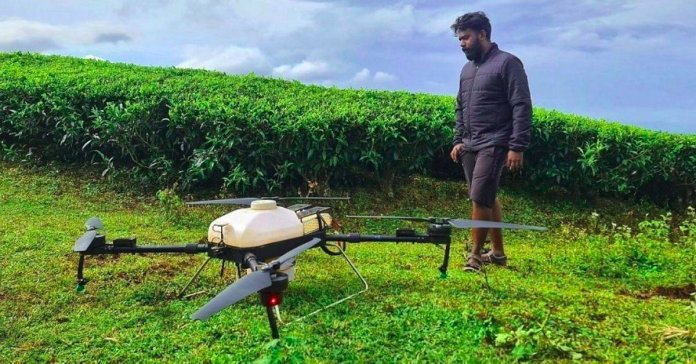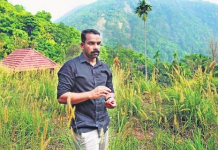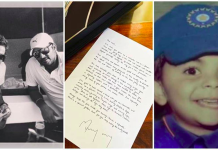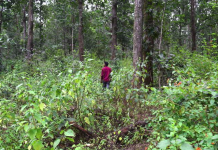For the brother-sister duo, Devika and Devan Chandrasekharan, the smell of soil evoke many childhood memories. The siblings were born into a farming family in Alappuzha, and have always been fascinated by green fields and homegrown agricultural products.
But innovating a solution to benefit hundreds of farmers was never really on the cards. Devika pursued a degree in electrical and electronics engineering, at the same time as Devan went for aeronautical engineering. But after the Kerala floods in 2018, they knew it was time to take stock of the devastation the disaster had caused to the farming community.
How and when did they start?
“Farmers were among those worst hit by the floods. Kerala’s generally fertile land was destroyed due to the removal of topsoil, and harvesting good yields became an impossible goal. Our mission was to aid them with a useful innovation,” Devan tells media. And so, in 2020, they formed Fuselage Innovations, a startup that provides agricultural aerial plant surveys and sprays fertilizers with drones, which the founders say results in maximum utilization of resources and better production. The company manufactures customized Unmanned Aerial Vehicles (UAV), or drones, for plant mapping and aerial spraying.
“The days of scouting crop health manually are a thing of the past. Aerial surveys deliver valuable data quickly and autonomously. Fuselages dedicated high-precision UAVs built for various activities including agriculture missions, soil monitoring, and vegetation management. Aerial Spraying UAV crafted for the optimum smart agriculture solution to support higher payload, optimizes the cost-effectiveness of crop ultra-low volume nutrient spraying, accurately and safely delivers more in less time,” says Devan.
How the startup works?
The startup performs a thorough analysis of soil types, crops, and required nutrients, to create these drones. For this, they conduct direct farm visits. Devan says that aerial spraying UAVs can cover up to 50 acres in a day with the minimum resources. Fuselage charges Rs 5,000 per acre and manufactures both agricultural and FPV (first-person view) drones.
“I have worked as a freelancer for similar projects. Devika is into business, so she handles that part completely. The innovation was challenging at the beginning but was favored with grants, funds, and recognition at needed times. Everything fell into place and now we can help more than 370 farmers across Kerala, Tamil Nadu, and Maharashtra,” the 26-year-old says. “Fuselage is the first startup in Kerala to hold permits from the Union Ministry of Agriculture and the Department of Civil Aviation,” he adds. Advisors of the company include CA Girishankar, design engineer Athul Chandran, as well as Dr. Berin Pathrose from the Department of Entomology of Kerala Agricultural University.
Farmers spend Rs 5,000 and save around Rs 15,000
Devan explains, “By spending Rs 5,000 for the process, farmers save around Rs 15,000 as labor cost and price of fertilizers as well as consumption rate. There is also a visible growth in yield, which is up to 40 percent.”
Shinoj Subramaniyam, senior scientist at Ernakulam Krishi Vigyan Kendra says, “Fuselage Innovations has assisted Ernakulam KVK for testing organic pesticides. It is a promising technology that can replace labor in the paddy field. The spraying can be done on the 70th day of sowing to get the best result.
“This method is a boon for large-scale farmers like me. It cuts the manual labor and the cost associated with it. Usually, the process takes four rounds with multiple laborers. Using drones, it finishes in just two rounds, with half the cost. It also covers every inch of the farm without spoiling the plants” says Sameer P, who cultivates paddy on 170 acres of land in Cherthala. He revealed that using drones also controls the amount of fertilizer released. “Only half the amount of pesticides/ fertilizers are used in the spraying method,” he adds.
“Incorporated in July 2020, the startup made its prototypes of unmanned aerial vehicles for Make in India, Atmanirbhar Bharat project for precision farming. “We got grants and seed fund assistance from the PM initiative through the Ministry of Agriculture for the completion of the project. During the 16 month journey, we got four series of achievements from different ecosystem partners,” says Devan in pride.
The startup secured a grant through the ministry of electronics’ Nidhi Prayas program and Agnii Invest India listed the project on their portal. The United Nations Development Program categorized the innovation in sustainable development goals (SDG) zero hunger and the startup received a grant for prototype development.
“TCS foundation initiative Digital impact square recognized our project as innovation in agriculture and we received grants from them too. We have been announced as the best performing startup in the Hackathon SCOUT 2021 organized by STPI Bhuvaneswar and the ministry of electronics,” he added.
“All these recognitions have come as a surprise to us. We had started off by thinking this is going to be a challenging business. More than just being a company looking for profits, we feel content that we can help farmers, without whom our very survival is at stake,” says Devika.















